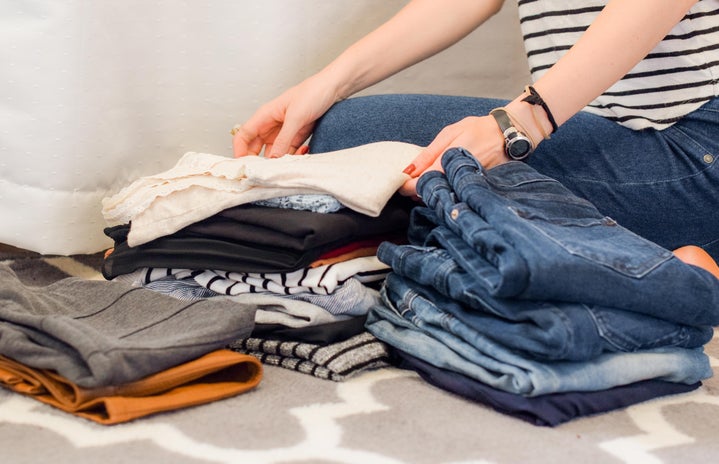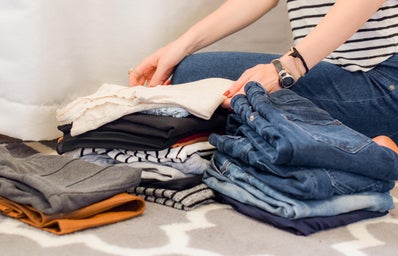This week, Jaz tackles one of the most popular second-hand online stores in the UK, Depop. Analysing the effectiveness of more sustainable shopping – but with the added popularity of this form, prices are often higher than expected…
Depop is a fashion marketplace where people can buy and/or sell unique items or clothing they no longer wear or have use for anymore. The platform denotes itself as a ‘community-powered fashion ecosystem that’s kinder on the planet and kinder to people’.
Depop was founded in 2011 by Simon Beckerman, but it has only been over the last few years that the platform has found its place in mainstream culture. Notably, its popularity has skyrocketed globally, becoming something of a phenomenon, with currently more than 30 million registered users in over 150 countries.
I myself am one of the 30 million users using Depop to sell the clothes I no longer wear, in order to make a little extra income while I am studying at university, without having to do that much at all! I think that Depop appeals massively to the younger audience, as it is a place where people can make money or start up a fashion business in a relatively straight-forward manner. I like to call it the sustainable version of ASOS!
90% of Depop users are under the age of 26
THE GOOD?
- Sustainability:
Like many people, I myself am guilty of buying into fast fashion. I avoid notoriously bad companies such as Shein and Boohoo, but I am aware that almost everywhere I shop constitutes and feeds into the unsustainable market of fast fashion. However, understanding how our fashion choices can impact the environment is incredibly important. Whilst you may be listing something on Depop that had a negative impact on the environment when it was manufactured, by selling this item on again you are making a positive action to help the planet.
Buying clothes second-hand is a great way of reducing global carbon emissions.
- An inexpensive way of living:
Are you somebody that loves fashion, but struggles to justify paying a hefty price tag and finding something sustainable? Well, Depop is the way forward.
Many people are selling good quality and trendy clothes for reasonable prices on the platform. I become inspired to start selling my clothes on Depop when I began looking through my wardrobe. I suddenly realised I had so many nice clothes hanging up that I no longer wore!
I do not regret my decision to start selling on Depop, because over the past 6 months I have made over £200. For example, this week alone I have made £35, and I can now use that to pay for a weekly shop and a night out!
- A platform that inspires creativity and provides business opportunities:
Whilst I haven’t done this myself, a lot of people use Depop to sell their unique items they have created themselves. For example, some people use this platform to sell handmade jewellery. It is a brilliant entrepreneurial choice!
If you have a passion for making things, you can begin starting a small business through Depop, and who knows where this could lead you? Perhaps creating your own business and website…
THE BAD?
- Loss in revenue:
Now, like many businesses, they will lose a percentage of their profit due to certain fees. However, I find that selling on Depop can decrease your profit a lot. I tend to make my ‘buyers’ pay for shipping using Hermes. This means they pay £2.99 for a small package.
However, if you give free shipping this will automatically decrease your income from that item.
To illustrate how much money, you can lose on your item, I will give an example of a ‘bundle’ (selling two or more items to the same person), I sold this week. The buyer wanted a pair of jeans I was selling for £20, and a top I was selling for £10. Due to her buying a bundle, I offered free shipping. I received a total of £21.44, losing out on £8.56. This is because when making a sale, Depop charge a 10% fee, a standard transaction fee across PayPal and Depop Payments, and the cost of the shipping if you have offered it for free. Also, because I sold it as a bundle, the Depop fees are deducted from each item. If I had wanted more profit, I could have made the buyer pay for the shipping, but that kind of takes away from the bundle deal! I have personally found selling on Depop a trial-and-error process that takes time to master; it takes a lot of practice to know what is cost effective!
- Scamming:
If you are thinking of starting to buy and sell on Depop, you do need to be aware of the risk of scammers. Personally, I have never been scammed or scammed anyone. But it does happen so be careful!
THE UGLY?
- Unethical?
Whilst Depop isn’t advocating unethical acts themselves, it has become a hot debate whether reselling clothes from charity shops is wrong. In recent years, thrift shopping and charity shopping has gained increased popularity, especially with past fashion trends such as ‘’Y2K’ (the year 2000) coming back into the industry. People began to realise that they could find a trendy item of clothing for £3 in a charity shop, and resell it on Depop for £20, especially because it would be ‘one of a kind’!
Like any debate, there are two sides. Some people believe it is harmless as the charity shop is still receiving a payment, also reselling the items is a business savvy move. However, there is the other side of the debate which highlights the fact that through this the reseller receives a larger payment for the item of clothing than the charity themselves, which seems pretty unethical to me! Additionally, charity shops are seeing less items coming into their shops, as people are now selling more frequently. Also, with more and more people going into the shops to find desirable items to sell, stocks quickly begin to run low. For people who depend on charities shops as their only means of buying clothes in the most inexpensive way, the recent surge of Depop means that more people are going to the shops and buying clothes to sell and make a profit. As a result, there are less options for the people who genuinely depend on the charity shops.
SO…?
For me, Depop is fun to use, and I really enjoy it. I have found it to be a more sustainable option to take when buying and selling clothes, whilst also making easy money as a uni student. It’s ideal!
So why not give it a try if you haven’t already?


